More than 70 years after the Holocaust, hatred, antisemitism, and genocide still threaten our world. The life stories of Holocaust survivors transcend the decades and remind us of the constant need to be vigilant citizens and to stop injustice, prejudice, and hatred wherever and whenever they occur.
This podcast series features excerpts from 48 interviews with Holocaust survivors conducted at the Museum as part of our First Person public program. Listen to these interview excerpts below. You can also watch video recordings of interviews from our First Person seasons here.
First Person is made possible by generous support from the Louis Franklin Smith Foundation with additional funding from the Arlene and Daniel Fisher Foundation.
-
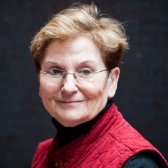
Josiane Traum: Hiding in a Convent in Brugge
April 27, 2010
Josiane (Josy) Traum discusses her memories of life in hiding at a Carmelite convent in Brugge, Belgium. In 1942, as conditions grew increasingly more dangerous for Jews living in German-occupied Belgium, her mother, Fanny, arranged to have Belgian nuns hide her three-year-old daughter in the convent. -
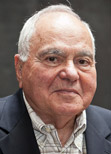
Julius Menn: Flight from Invading German Troops
July 1, 2009
Julius Menn discusses his family's flight eastward from advancing German troops invading Poland in September 1939. Julius's family escaped from Bialystok, Poland, to Vilna, Lithuania, eventually making their way through the Soviet Union to Palestine, where they had previously lived. -
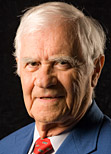
Leon Merrick: Evacuation and Arrival at Buchenwald
April 29, 2009
In December 1944, as the Soviet army approached the slave labor camp in Poland where Leon Merrick was imprisoned, the Germans evacuated him to the Buchenwald concentration camp in Germany. Leon shares his recollections of the evacuation and his first day in Buchenwald. -

Leon Merrick: Importance of Work in the Lodz Ghetto
July 1, 2008
Leon Merrick's job delivering mail in the Lodz ghetto became all the more difficult over time as Nazi deportations to the extermination camps increased and he was often given the task of delivering notices for deportation. -
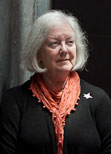
Louise Lawrence-Israëls: First Days of Freedom
June 17, 2009
Louise Lawrence-Israëls discusses her first memories of freedom after over two years spent in hiding with her family in an apartment in Amsterdam. In May 1945, Canadian forces liberated Amsterdam. Louise was three years old and initially had difficulty adjusting to the world outside the apartment, having never been outside for the duration of the hiding. -

Louise Lawrence-Israëls: A Family’s Efforts to Create a “Normal Life” while in Hiding
June 25, 2008
Louise Lawrence-Israëls shares memories from her early childhood spent hiding in Amsterdam. In 1942, six-month-old Louise and her family went into hiding on the fourth floor of a rowhouse, where they remained until the end of the war in 1945. -
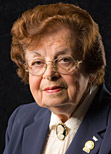
Manya Friedman: Death March to Ravensbrück
May 27, 2009
Manya Friedman discusses her evacuation from Gleiwitz, a subcamp of Auschwitz, to the Ravensbrück concentration camp in January 1945. In an effort to cover up their crimes and prevent prisoners from falling into enemy hands, the Nazis evacuated prisoners in what became known as death marches. -
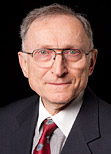
Marcel Drimer: Escaping the “Concert of Death”
April 15, 2009
Marcel Drimer, his sister, and mother hid in a wheat field while a German aktion—a violent operation against Jewish civilians— occurred in their town of Drohobycz, Poland, in August 1942. -

Margit Meissner: Flight from Paris on a Bicycle
August 12, 2009
Margit Meissner discusses her flight from Paris just before the city fell to the Germans in June 1940. Margit and her mother were Austrian citizens living in Paris, which meant they were considered “enemy aliens” because Austria was annexed by Germany in 1938. They were ultimately separated and Margit was left with the responsibility of getting safely out of Paris on her own. -
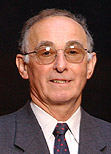
Martin Weiss: Reflections on Liberation
May 7, 2008
Martin Weiss discusses his liberation from Gunskirchen, a subcamp of Mauthausen, in 1945 and the days immediately following.

